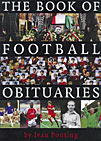 by Ivan Ponting
by Ivan Ponting
Know the Score, £16.99
Reviewed by Roger Tiford
From WSC 257 July 2008
There are two types of obituary, the personal – written by someone who knew the deceased – and the professional. Ex-footballers tend not to have close friends or family who can offer a thousand finely wrought words at the drop of a chap so, for the benefit of readers of the Independent, Ivan Ponting has being doing this duty for the past 15 years. Given that newspaper’s circulation, this collection of obituaries will be fresh, yet timeless, material for the vast majority of fans.
The subjects range from Best, Ball and Ramsey to a handful unknown to me, arbitrarily but not unsatisfactorily arranged in their order of dying as they might be in a graveyard, each accompanied by a photograph, generally characterful. Ponting’s voice is both the major strength and minor weakness of the work. He combines solid craft, good judgment and factual precision. He always writes well, occasionally sumptuously, sometimes flecked with the fossilised language of 1950s football programmes. It has been a while since I’ve seen the word “doughty” in print (and never before without its customary accompanying noun, “pivot”). “Flinty” is another favourite term, so too “dreadnought”. Spread over 15 years you would not notice Ponting’s repetition, but over 200 pages it does pall a little. Nevertheless, his style is a refreshing change from the modern manager-speak of “putting quality into the final third”.
Without the personal and intimate knowledge that informs the very best obituaries, Ponting relies on an encyclopaedic knowledge and a substantial library for detail. He obeys the obituarists’ code of merely alluding to faults and unpleasantness. As a reality check, a perusal of the entry on Emlyn Hughes shows quite enough space to read between the lines, as they say. Even allowing for understatement, one wonders quite how harsh manager Bill McGarry must have been (“abrasive”, “typically tough” and “goading” to pick just a few, as well as being a “veritable dreadnought” for good measure).
The lack of intimacy with the subject shows most clearly when touching on the life outside football. The latter half of Johnny Haynes’ life is summed up in just a dozen words, “and with his wife Avril ran a dry-cleaning business in Edinburgh”. It is hardly possible for Ponting, or anyone else, to do differently, but these are the obituaries of football careers rather than of men who played football; more a series of elegant and elongated pen pictures.
Of course there are surprises at some of the younger inclusions who passed without my noticing: Graham Paddon, Terry Hibbitt and Keith Weller, for instance. Car crashes and injuries, often of the serial knee variety, feature frequently as major turning points in careers. The prime of Ian Hutchinson of Chelsea was remarkably brief, a sad testimony to the aggression of the early Seventies. Reflections can be had aplenty by dipping in here and there. It’s one for the loo shelf, a fine book that, as an A4 hardback, demands a fine loo with a substantial shelf.